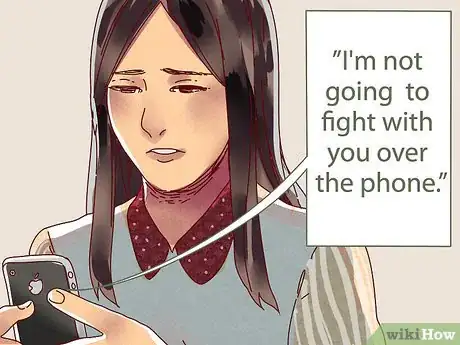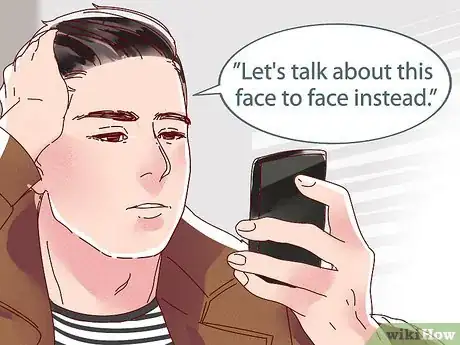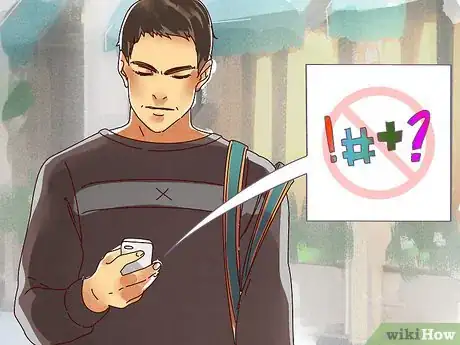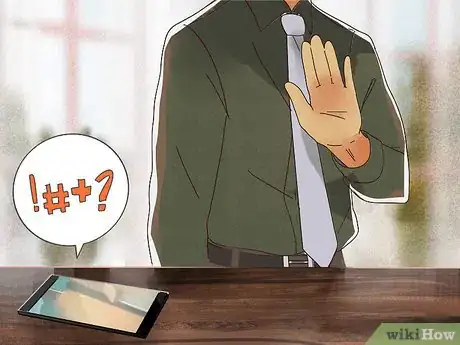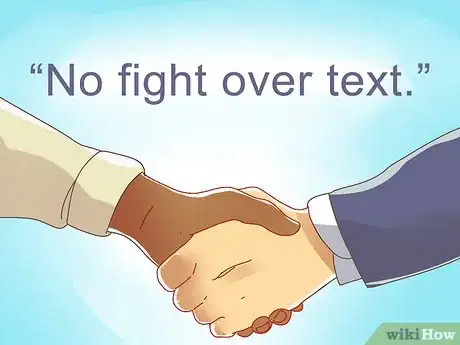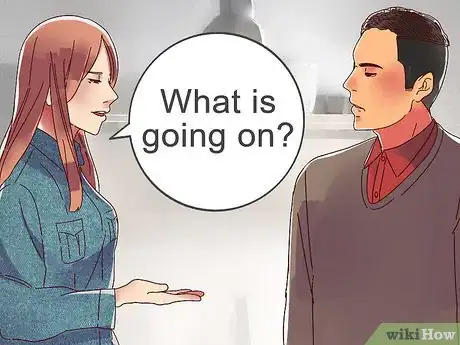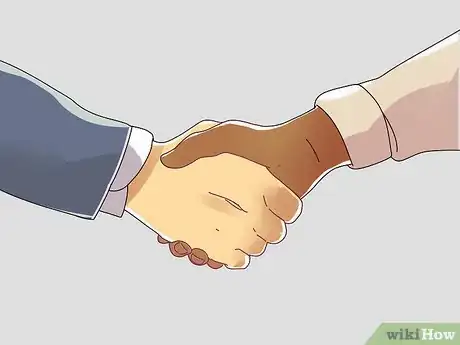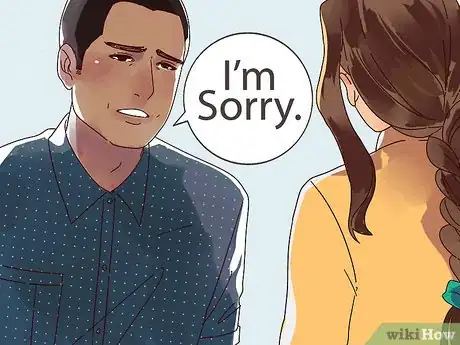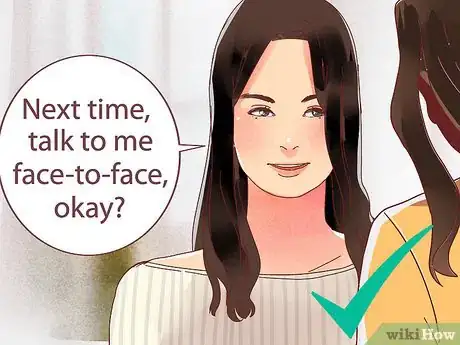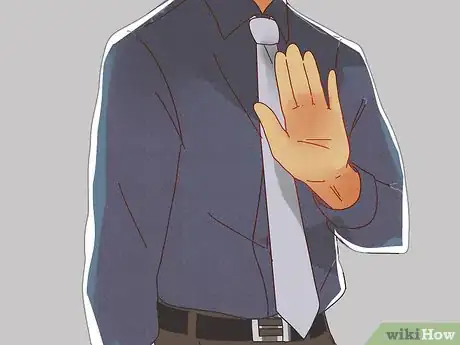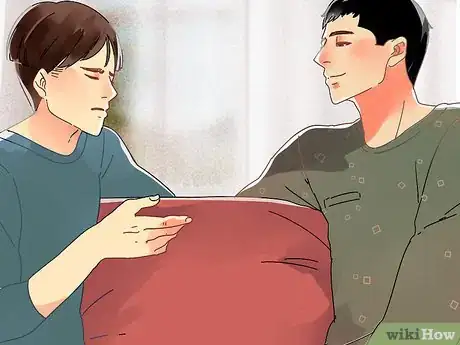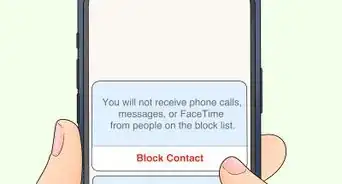This article was co-authored by Ebony Eubanks, MSW, ACSW, CAMS-II. Ebony Eubanks is a Therapist, and Founder and CEO of Peaceful Living Counseling and Professional Services of Philadelphia, PA and in Hockessin, DE. With over a decade of experience providing counseling and coaching to individuals, couples, and groups, she specializes in depression, anxiety, couples work, life guidance coaching, and anger management. Ebony holds a Master’s in Social Work from Temple University and is a member of the Academy of Certified Social Workers. She is a Certified Anger Management Specialist-II, Level II trained Gottman Couples Therapist. and Certified Gestalt Therapist. Ebony also holds additional certifications in Advanced Clinician Training.
There are 8 references cited in this article, which can be found at the bottom of the page.
This article has been viewed 63,597 times.
All friendships have their ups and downs and you may find yourself fighting with each other at some point. Fighting over text, while common, is rarely helpful, and usually only prolongs and complicates a fight. So while getting out of a text fight might seem difficult, with some careful communication and conflict resolution, you should be able to resolve the fight and get back to being friends.
Steps
Ending Text Communication
-
1Tell them you are not going to fight over text. In getting out of a text fight with a friend, it is important to communicate immediately that you are not going to fight with them over text. It will only make things more difficult for the two of you. Be clear, kind, and firm in telling them that you will not continue to communicate this way with them. Try sending the following messages.
- ”It seems like you are upset. I'd rather not fight about this over text message.”
- ”I'm not going to fight with you over the phone.”
- ”It's not going to be helpful to do this over text.”
-
2Ask to discuss whatever is going on, in person. After informing your friend that you will not fight over text, ask them to speak with you in person. Speaking in person will allow you both to get a clearer picture of how you are feeling and what's going on.[1] Schedule a time and a place to meet with them to talk about what is going on. You may have to repeat the request to meet instead of fighting over text. Try the following.
- ”Let's talk about this face to face instead.”
- ”I want to make sure I give this the attention it deserves. When can we meet to talk about it?”
- ”I'm confused, let's meet up and talk.”
- ”Let me know when you are ready to talk about this in person.”
Advertisement -
3Avoid actions that will make the fight worse. It can be very easy to react emotionally when a friend is fighting with you. Try and remember that getting out of a text fight with your friend should include the minimal amount of text communication possible. Try texting just logistics or plans to meet up only. Along these lines, avoid actions that will make the argument worse. Try and take a few minutes before you respond to anything over text to give yourself time to make a more rational decision. Avoid the following.
- Sending meme reaction pictures.
- Responding with only emojis.
- Name calling, cursing, or blaming language.
-
4Do not respond. After you have made requests to not fight over text and to meet up to discuss in person, your friend may keep sending you messages. If they keep trying to contact you, do not respond. It may be difficult, but stick to your word in saying you will not fight over text.[2] Responding will only show the friend that you will engage with them or continue to fight with them over text.
- If it becomes distracting or begins to interfere with you life, consider blocking their number for a while.[3]
-
5Avert future text fights. If you are a teenager, college student, or just prefer texting, chances are most of your communication is over text messages. Using text messages as your main form of communication may result in text fights being a recurring problem in your friendships. Fights occur more easily over text as well due to being unable to see reactions to texts or reading tone of the speaker. Try incorporating the following into your friendships to avert any future text fights.
- Don't start text fights yourself. If you instigate a text fight with a friend, that sends the message that fighting over text is okay. If something upsets you give yourself some time to process it, and talk to them about it in person.
- Set up a “no fight over text” rule in your friendship. Talk to your friend about it. Make an agreement that your friendship is too important to let text fighting get in the way. Remind each other of that rule when necessary.
- If you have a friend who repeatedly fights with you over text or who does not respect your wishes to talk in person, consider the future of your friendship. Not everyone is ready to be mature about their relationships. You may have to scale back on your friendship with them until they are able to maturely talk about problems that pop up.
Addressing the Fight in Person
-
1Talk with them and discuss what the problem is. Getting out of a text fight with your friend will likely include working past the point where you have stopped texting each other. To ensure that the text fight does not reoccur or continue, talk with them about it.[4] Hopefully, you were able to schedule a time to meet with your friend. Pick a place and a time that is convenient for the both of you.[5]
- Thank them for meeting with you. Even if you didn't start the fight it sets a good tone for the rest of the talk. Try, “Thanks for meeting with me to talk about this.”
- Open the conversation by asking about what happened. “What is going on?” or “What had you so upset the other day?”
- Explain your side of the situation including your feelings and your actions. “Here's how I feel about it and why I did what I did.”[6]
-
2Listen to your friend. It is possible that you will be frustrated with your friend, or annoyed at having to take extra time to work on resolving a fight. Try and listen to your friend and view things from their perspective.[7] Allow your friend the time and space to express how they feel, and validate those feelings for them. While you are listening to their side, try the following to communicate to them that you are listening.
- Make eye contact.
- Put away all distractions including your phone.
- Don't interrupt them.
- Lean slightly towards them.
-
3Try to compromise. Once you have discussed what the conflict is with your friend, try and come to a solution by compromising. Compromise means that you and your friend come to an agreement where you “meet in the middle.” Offer up suggestions for things you think might help, and be open to suggestions your friend makes.
- If it is a big fight, consider taking some breaks or some time apart to think things through. Offer to come back at a specific date and time to try talking about it and compromising again.
-
4Apologize to your friend. Strong emotions and reactions often stem from feelings of being hurt.[8] If some action you took upset your friend, apologize. Even if it was nothing you specifically did, you can always apologize for the fact that you are fighting.[9] While you are talking with them acknowledge that you heard and understood what they said to you. Apologize by saying the following.
- ”I did not realize the effect this was having on you. I'm sorry.”
- ”I apologize, I did not mean to hurt you.”
- ”I hear you. Thank you for talking to me about it. I'm sorry this happened.”
- ”I'm sorry we're fighting.”
-
5Talk about communication going forward. It may be helpful, while talking to your friend about this fight, to make a plan for the future.[10] You don't want to plan on a future fight with your friend, but friendships have ups and downs. It may help to talk about your friendship going forward and how you'd like to approach disagreements or fights.[11] Mention that you don't want to fight over text and prefer to face things head on. Try saying the following.
- ”I'm glad we had this talk. Let's always try and talk things out face to face.”
- ”Thanks for working through this stuff with me. It's so much better this way than over text.”
- ”I really hate fighting over text. Next time, just pull me aside or as to talk to me face-to-face, okay?”
Keeping Calm
-
1Keep your emotions in check. While you are navigating this fight with your friend, try and keep calm by not letting your emotions get the best of you.[12] It may be difficult to do, but it will make it easier to resolve the tension between you and your friend.[13] Try calming your emotions with the following.
- Pause and count to 5 before responding if you are speaking in person.
- If you are texting, put your phone down and walk away from it for a few minutes.
- Close your eyes and take several deep breaths.
- Don't react or retaliate immediately, give yourself time.
-
2Suggest a break. If you feel your emotions getting to you, or if you can see that high emotions are making the discussion difficult, suggest a break.[14] Taking a break from a fight or a discussion allows you and your friend to calm down and gain a little perspective. It may also help the discussion be more successful. Suggest a break in the following ways.
- ”Okay, things feel a little heated. Let's take a few minutes and cool down.”
- ”I'm getting really frustrated. I'm going to take a short walk to calm down a little bit.”
- ”I feel like we are both getting angry and not getting anywhere. Let's take some time to cool down.”
-
3Vent to a trusted friend instead of social media.[15] Fighting with someone you care about is always difficult. Whether it was a fight because of something you did or a fight due to a disagreement, it can still be stressful. When you are stressed it is important you have someone to talk to about it. During this fight, choose to talk to a trusted friend or a family member privately. Venting over social media involves a lot of people unnecessarily and risks making matters worse.[16]
Expert Q&A
-
QuestionWhen should you let a friend go?
 Tala Johartchi, PsyDDr. Tala Johartchi is a Clinical Psychologist based in the Los Angeles, California metro area. With expertise and advanced training in Evidence-Based Practices and therapeutic/behavioral frameworks, Dr. Johartchi specializes in working with individuals, couples, and families experiencing Substance Disorders, Love Addiction and Codependency, Post Traumatic Stress Disorder, as well as common co-occurring disorders such as Depression, Anxiety, and Relational/Attachment difficulties. She earned an MA and PsyD in Clinical Psychology from The American School of Professional Psychology at Argosy University, San Francisco.
Tala Johartchi, PsyDDr. Tala Johartchi is a Clinical Psychologist based in the Los Angeles, California metro area. With expertise and advanced training in Evidence-Based Practices and therapeutic/behavioral frameworks, Dr. Johartchi specializes in working with individuals, couples, and families experiencing Substance Disorders, Love Addiction and Codependency, Post Traumatic Stress Disorder, as well as common co-occurring disorders such as Depression, Anxiety, and Relational/Attachment difficulties. She earned an MA and PsyD in Clinical Psychology from The American School of Professional Psychology at Argosy University, San Francisco.
Clinical Psychologist When it comes to your friendships, it's important to evaluate the people around you and ensure that they want to grow and evolve with you, without being stuck in negative patterns. Make sure you surround yourself with people who want to grow with you. Otherwise, your friendships will feel incredibly unfulfilling.
When it comes to your friendships, it's important to evaluate the people around you and ensure that they want to grow and evolve with you, without being stuck in negative patterns. Make sure you surround yourself with people who want to grow with you. Otherwise, your friendships will feel incredibly unfulfilling. -
QuestionMy best friend is really mad at me for saying something really mean. I want him back. I apologized, but he isn't responding. What should I do to get him back?
 Community AnswerWait. It takes some time to forgive if the words really hurt. If he truly is your friend and you've sincerely apologized, he should eventually forgive you.
Community AnswerWait. It takes some time to forgive if the words really hurt. If he truly is your friend and you've sincerely apologized, he should eventually forgive you. -
QuestionHow can I get out of a fight when my friend and I are saying hurtful things to each other and are saying we care about each other but are not showing it?
 ThegreatACommunity AnswerFirst, find what the problem is. If you want to solve it, you need to know it. After that, tell your friend that you dislike so much the idea of you fighting and mention how much you care about your friendship. Learn to say sorry more often, and when it comes to saying hurtful things, say things that you are grateful for, like: ''Thank you for helping me with...'', ''Thank you for being there when I needed,'' and other things. Do not try to run from it, try to solve it. In the end everything is going to be okay!
ThegreatACommunity AnswerFirst, find what the problem is. If you want to solve it, you need to know it. After that, tell your friend that you dislike so much the idea of you fighting and mention how much you care about your friendship. Learn to say sorry more often, and when it comes to saying hurtful things, say things that you are grateful for, like: ''Thank you for helping me with...'', ''Thank you for being there when I needed,'' and other things. Do not try to run from it, try to solve it. In the end everything is going to be okay!
References
- ↑ https://kidshelpline.com.au/kids/tips/resolving-fights-with-friends/
- ↑ http://www.huffingtonpost.com/andrea-wachter/conscious-relationships_b_4555380.html
- ↑ http://www.hercampus.com/life/family-friends/how-get-through-fight-your-bff
- ↑ http://www.hercampus.com/life/family-friends/how-get-through-fight-your-bff
- ↑ https://cmhc.utexas.edu/fightingfair.html
- ↑ https://cmhc.utexas.edu/fightingfair.html
- ↑ http://www.pickthebrain.com/blog/resolving-conflicts-quickly-and-peacefully/
- ↑ https://www.mindtools.com/pages/article/how-to-apologize.htm
- ↑ http://www.pickthebrain.com/blog/resolving-conflicts-quickly-and-peacefully/
- ↑ https://kidshelpline.com.au/kids/tips/resolving-fights-with-friends/
- ↑ http://www.hercampus.com/life/family-friends/how-get-through-fight-your-bff
- ↑ http://lifehacker.com/how-to-control-your-temper-before-you-lose-it-1698897376
- ↑ http://www.pickthebrain.com/blog/resolving-conflicts-quickly-and-peacefully/
- ↑ http://www.pickthebrain.com/blog/resolving-conflicts-quickly-and-peacefully/
- ↑ http://mashable.com/2015/11/07/why-you-cant-win-facebook-fight/#m9jkKS1gI8qM
- ↑ http://www.hercampus.com/life/family-friends/how-get-through-fight-your-bff
